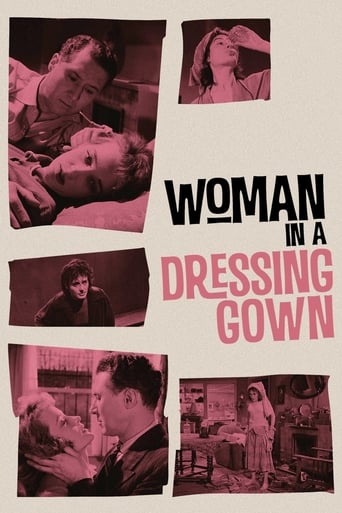howardmorley
This film from 1957 warns married women that too much devotion to husband & family often rebounds as they may often be tempted to take you for granted and start treating you like an unpaid servant.The trend now is for intelligent married women to have some "me time" which could involve developing their hobbies, pastimes interests & travelling on their own.Married women in 1957 were not so independent and relied too much on their husbands for emotional support and for material comforts.Of course today in 2018 the woman's movement has done a lot to help their own sex and with two female prime ministers, equal sexual rights legislation, and has changed a great deal for women over the last 60 years.Yvonne Mitchell's character is not well educated but always means well in dealing with her family.She is disorganised and inefficient which seems to cause great frustration to Anthony Quaile who plays her husband and who feels life has been slipping away from him and feels impelled to seek an office affair with his secretary (played by Sylvia Sims) at the firm of timber importers at which they both work.Young Andrew Ray (son of comic Ted Ray) plays their son who is caught in the middle of his parents marital strife.I rated this wholly British produced B&W film 7/10 which I saw on "Talking Pictures" channel 81 tonight.
mark-sulli
I recently saw this film on Talking Pictures, and intended to switch-off after a few minutes, as it didn't seem like my cup of tea (eg film noir).
I then gradually found myself bewitched by Yvonne Mitchell's stunning performance - one of the best I can recall by any actress. The domestic scene where she attempts to get the flat and herself ready, while getting steadily plastered, is a masterpiece of the actor's art. I also have to say, I find her drop-dead gorgeous - so why anyone would want to dump her is a bit of a mystery !
writers_reign
The first feature film written by Ted Willis was Good-Time Girl in 1947 and within the decade he was chronicling the other side of the coin and the conclusion would seem to be that Sinner or Saint it's not much fun being a girl. By 1957 the 'kitchen sink' school of drama was firmly established on both stage and screen courtesy of plays like Look Back In Anger, which John Osborne unleashed in 1956 and films not a million miles away from Good-Time Girl and The Blue Lamp, also the work of Willis. Anthony Quayle and Sylvia Syms had been involved in Ice Cold In Alex yet there's an odd lack of chemistry between their semi-adulterous (she isn't married, he is) lovers as indeed there is between Quayle, a Shakespearean actor never fully at ease in modern dress, and Yvonne Mitchell, who walks away the the film, slipping easily around a wooden Andrew Ray as the son of herself and Quayle. It was probably seen as a taut, gripping drama in its day but that day wasn't yesterday or even the day before and time could have been kinder, nevertheless it will reward a look.
donaldgordon797
To me this movie must be the first of the "kitchen sink" dramas of post war Britain as it came out in the fifties,long before the sixties made the genre popular. Woman in a Dressing Gown has been described by film historian Jeffrey Richards as "a Brief Encounter of the council flats", taking the scenario of a extra-marital affair and relocating to a less middle-class setting. However, writer Ted Willis described it more simply, as a film about " good honest fumbling people, caught up in tiny tragedies". As its female-focused title suggests, the film spends a lot of time on Amy, the wife whose devastated when her husband asks for a divorce. She gives it the works as the drudge who fights to rekindle the affection of her husband. There's a great bit when her new hairdo gets ruined by the rain, but it's heavy weather throughout. Amy is anything but the model '50s housewife: she burns food, never finishes the housework, always has the radio on too loud, and rarely has time to get dressed properly. But the film allows us to see reasons why she might have become that way (grief,loneliness,boredom) rather than simply demonising her. Do not watch this film if your at a low and feeling depressed as it will definitely not help. Yvonne Mitchells bravura performance won her the Berlin Film Festival's Silver Bear award for best actress


